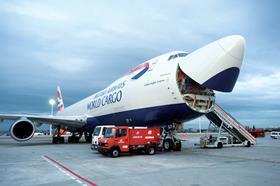
With the capacity to handle over 140,000 tonnes of perishables at its Heathrow site annually, IAG Cargo has spotted an emerging trend is an increase in imports of tropical fruits.
Largely due to a prolonged spell of wet and cold weather, the airfreight logistics giant reported an 18.5 per cent increase in fresh produce imports into the UK market last year, and global brands manager Darren Peek claims British consumers are acquiring a greater taste for the exotic.
“There has been a real change in tastes over recent years and people want more exotic fruits from Africa and Latin America as both are regions which can deliver prepared tropical fruits and tasty berries such as blueberries and blackberries,” he explains. “Whether it is supermarkets or their buyers, our teams around the world are seeing a considerable increase in demand for exotics.”
Despite the International Air Transport Association (IATA) reporting flat airfreight volumes for May 2013, Peek insists that business is good with perishable imports from Latin America rising 15 per cent in 2012. He adds that Africa also represents a strong up-and-coming market.
Another area growing rapidly is ornamentals, with UK flower imports, since 2010, up a staggering 71 per cent for IAG Cargo. Peek adds: “Flowers really are recession proof and this is being shown with an increase in global demand. Russian demand for flowers is big right now and their global import growth through our network is up well over 500 per cent in recent years.”
According to Peek, the rise of the middle class in emerging markets, such as Russia and China, means foreign consumers are diversifying what they eat, leaving a “massive opportunity” for UK producers. He could have a point, with the global middle class population expected to rise to five billion by 2030 [UN]. However, Peek admits that UK fruit and vegetable exports are still too low, with 90 per cent of the logistics giant’s UK exports currently fish.
Around 80 per cent of IAG Cargo’s perishables are flown in on passenger flights, and Peek insists that the firm, which recently invested in its fleet, presents an environment-friendly option for importers.
“Fruit and vegetables have a limited shelf life, so there are massive benefits on airfreight – the CO2 emissions are lower and on our Airbus A380 and Boeing 787 planes we offer flexible air conditioning systems so each load can be held at specific temperatures. From the time an order lands, it will be ready for customer collection within three hours.”
In the coming years, Peek predicts that the level of pre-packaged fruit and vegetables will continue to rise and says this is good news for the global supply chain.
He concludes: “While what we handle at the moment is still 60 per cent loose, this is slowly falling as more and more producers pre-package their perishables. I think this is only a good thing as the more hands fruit goes through, the shorter the shelf life. If UK firms can also utilise the best possible packaging technology, it can only be a good thing for increasing exports.”



